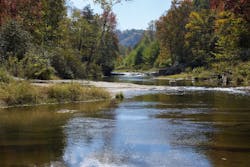North Carolina Coastal Federation Releases Statewide Roadmap for Flooding and Water Pollution
The North Carolina Coastal Federation released the Action Plan for Nature-based Stormwater Strategies, which addresses frequent and intense rain events that cause flooding and pollute waterways.
The Action Plan for Nature-based Stormwater Strategies is based on input from over 60 experts from across business and government sectors and regions, according to the North Carolina Coastal Federation. These experts recommended ways to enhance the use of natural and nature-based solutions that absorb rainwater and reduce flooding.
Nature-based storm water strategies include permeable pavement, cisterns and rain gardens to promote infiltration and rainwater reuse, according to the federation.
Four individual expert work groups examined opportunities to use these strategies to reduce flooding and water quality problems on four major types of major land uses in North Carolina: new developments, existing communities, roadways and transportation infrastructure, and working lands such as agriculture and forestry.
According to the plan, all four work groups identified impediments that hinder the use of nature-based storm water strategies, which include: lack of awareness and education, inflexible planning, regulation and policy, design challenges, high cost/and or gaps in funding, inadequate operations and maintenance, and lack of monitoring and evaluation.
According to the plan, the four work groups considered how to address these impediments with four recommendations:
- State and local governments can promote the use of nature-based storm water strategies and implement them widely where practicable
- Increase education, outreach and professional training for nature-based storm water and watershed management strategies.
- Create a Nature-Based Stormwater Steering Committee to ensure continued stakeholder engagement and leadership in support of long-term, meaningful progress
- Establish effective watershed management that focuses on protecting, restoring or mimicking natural water systems to reduce flooding and improve water quality
“Opportunities for practical, affordable and effective nature-based storm water strategies are missed in planning and management decisions in communities, roadways, forests and farms,” said Todd Miller, executive director of the federation in the North Carolina Coastal Federation press release. “When we seize these opportunities routinely to reduce flooding and protect water quality there will be many positive economic and environmental rewards for the whole state.”
Read the project background here.
